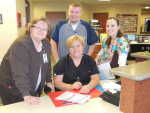Rural hospitals face challenges when recruiting new nurses

MCCOOK DAILY GAZETTE
SOUTHWEST NEBRASKA -- Nurses getting ready to retire and the reluctance of new nurses willing to re-locate to rural areas are some of the problems facing area hospitals in Southwest Nebraska.
Yet, rural hospitals also offer benefits not found in metropolitan facilities, such as immediate hands-on experience.
"In my opinion, there are many challenges on the horizon for nursing and one of the most difficult is the need for more qualified nurses in rural areas," said Mike Fritz, RN, BSN and Chief Nursing Officer at Tri Valley Health System in Cambridge, Nebraska.
"We have seen a steady increase in the need for nurses and a steady decline in the applicants qualified for those positions," he said. "At Tri Valley Health System, we feel particularly fortunate to have one of the best teams of nurses with many types of experience, including trauma care, obstetrical care as well as hospital care for all types of acute and chronic conditions.
"We are growing faster than expected and to keep up with that growth, we are looking for additions to our qualified team of nurses." Cambridge Hospital offers recruitment bonuses and tuition reimbursements, but nurses are still hard to come by.
Altough he agrees that there is a shortage of nurses, Fritz said he still believes in the quality of the people in Southwest Nebraska and Northwest Kansas and "have no doubt we will continue to have the ability to train and recruit the future nurses we need."
Jan Cole, Director of Nursing at the Dundy County Hospital in Benkelman, sees one factor contrbuting to the shortage of nurses could be the long waiting list at area schools.
The three schools in the area that train nurses - in Colby, Kansas, an LPN program at McCook Community College in McCook and a RN program in North Platte - have waiting lists, she said. The strict requirements for nursing teachers, that includes a masters' or doctorate, also plays into this, she said.
Cole said the nursing shortage could become especially acute in rural areas, as many new graduating nurses do not care to live in far-flung outposts such as Benkelman.
"They like the malls, the shopping, things to do," she said. This even affects recruiting physicians, she said, as the doctors are willing to move for the ample hunting and fishing but their wives prefer somewhere with more amenities.
Cole added rural areas may have an advantage in offering hands-on experience fairly quickly. There is a glut of new nurses in some metropolitan areas, she said, who cannot get jobs, as many require some experience, something small hospitals can offer.
The "graying of America" will have baby boomers retiring from the medical field in record numbers, at the same time when the older generation is coming into medical facilities for health care.
For Cambridge Memorial Hospitial nurses Dixie Landreth, Allison Elliott and Austin Gydesen, the small hospital atmostphere is more like family.
They also like the fact that nurses are able to do a multitute of activities, instead of staying in one area as in larger hospitals.
"You're able to do whatever you want, ER, OB, surgery, sometimes all in one day," said Gydesen, who used a scholarship offered at Cambridge for his RN education.
Elliot has been at Cambridge Hospital for three years and finds nursing a rewarding career on many levels.
"It's nice to know that you can make a difference in someone's life, every day," she said. "It's something different every day."
Colinda Nappa, administrator at Hillcrest Nursing Home, said she's heard of some instances where companies are sponsoring nurses from other countries, like the Phillipines, to come to the U.S. to work. At Hillcrest, the Foundation offers scholarships and tuition reimbursements for employees, a sort of "grow your own" for the facility.
Bottom line, nursing calls for a special kind of person, Nappa believes, someone who can deal with the long hours and stress yet still provide excellent patient care.
"It's not for everyone, it's a tough job...there's the long hours, difficult patients, being away from your family on the holidays....nursing is more of a calling in many aspects."
A total of 18,846 RNs work in Nebraska, according to the Centers for Nursing.
